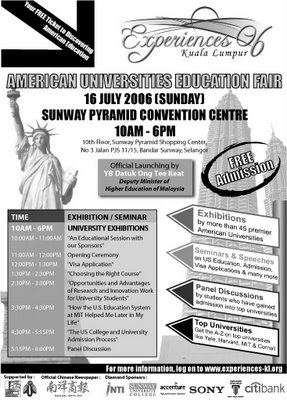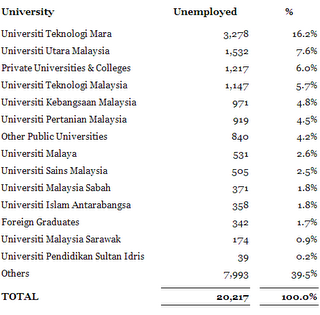Anyway, as usual, lots to blog about, lots to catch up on but just not enough time! :) I thought I'd start the ball rolling again with a non-controversial topic. I think the media both online and offline these days are filled with controversial issues. So we'd take a break from that :).
Many of us, myself included, would not have heard much about the "international baccalaureate" (IB) programme, specifically the IB Diploma Programme. Recently however, there has been more press given to the IB Diploma Programme as a good, or possibly better alternative to the 'A' Levels.
The IB Organisation (IBO) is a nonprofit educational foundation, motivated by its mission, focused on the student. Founded in 1968, we currently work with 1,874 schools in 124 countries to develop and offer three challenging programmes to over 481,000 students aged 3 to 19 years. As opposed to 'A' Levels, which is an export of the United Kingdom or SAT, of United States, the IB curriculum "represents the best from many different countries rather than the exported national system of any one. [The] challenging Diploma Programme assessment is recognized by the world's leading universities. [IBO] maintain [their] high standards by actively training and supporting teachers, and by authorizing and evaluating IB World Schools."
The IBO works with schools in 124 countries, headquartered in Geneva. They have offices / representatives in Bath, Beijing, Buenos Aires, Cardiff, Geneva, Mumbai, New York, Singapore, Sydney, Tokyo and Vancouver.
One of the leading global pre-university institution adopting the IB curriculum is the United World College (UWC), blogged here earlier. Ng Eng Han, a student at UWC-USA who has received his admission into Dartmouth College via early admission has also written a short piece on the IB diploma programme - what it's about and where it's offered. To find out more about the curriculum of the IB diploma programme, you may like to visit their official website.
More interestingly, and back to the comparison of 'A' Levels versus IB, it appears that the Universities and College Admission Service (UCAS) of the United Kingdom have recently endorse the IB diploma programme as being "academically superior" to the 'A' Levels programme.
A new points tariff announced by UCAS... made a relatively modest IB score of 35 points (out of a maximum of 45) equivalent to four and a half A grades at A-level.The 'A' Levels, which has been criticised in recent years as falling significantly in standards will find this "as confirmation of how far A-levels have slipped from the 'gold standard'." And it may hasten the switch of many schools around the world from conducting 'A' Levels to the IB Diploma Programme.
An IB score of 38, the average achieved every year by more than 200 pupils at Sevenoaks, one of the first independent schools to adopt the exam, was deemed to be equivalent to five As at A-level. Oxford and Cambridge typically ask for 40 points, equivalent to five and a half A grades.
Even 30 IB points is judged equivalent to three and a half As at A-level, sufficient to secure entry to most academically selective universities.
Worried about the dropping standards of the UK 'A' Levels programme, Singapore which uses the 'A' Levels qualification as the de facto criteria for entry into the universities, has clearly set out to differentiate its own 'A' Levels programme, distinct from that in the UK. As mentioned here in the press release way back in 2002:
In Singapore, students offer the Singapore-Cambridge A-level examination which is a separate examination, conducted jointly by MOE and the University of Cambridge Local Examinations Syndicate (UCLES). The Singapore-Cambridge A-level has its own set of question papers. The setting, marking and grading of the examination scripts are subject to stringent quality control procedures and are closely monitored by UCLES and MOE to ensure that grades awarded reflect accurately the performance of students.The question however, is whether, the 'higher' and 'stricter' 'A'-Level standards in Singapore will penalise the students there as opposed to those who too 'A'-Levels based on the "declining" UK standards? Will UCAS differentiate the grades?
MOE has assumed greater control of the Singapore-Cambridge GCE A-level examination from 2002. Our A-level examination papers are based on syllabuses that are designed for Singapore's educational needs. MOE and UCLES are responsible for the setting of standards and the awarding of grades. This means that Singapore students offer a set of examination papers which meet A-level standards but are separate and different from those offered by students in the UK. The grading of our A-level examination, jointly undertaken by MOE and UCLES, is also a separate process from that of British A-levels.
Anyway, given that the IB programme is offered only in a limited scale in Malaysia at this point of time, and not to mention, costing quite an arm and a leg, the question of which programme to take is probably moot even for students opting not to pursue STPM. Most Malaysians will still end up with 'A' Levels, South Australian Matriculation (SAM) and other matriculation examinations. However, this might just change in the near future.
For the moment, students pursuing other pre-university programmes including STPM need not be overly concerned. 'A'-Levels for example, is still well recognised around the world and as long as you do well in it, you can be certain of acceptance into the top universities of the world.
Thanks to LYL for the pointer. :)





